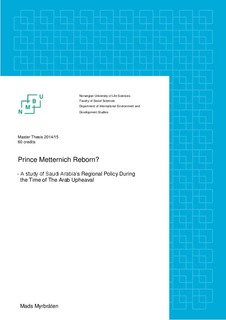| dc.description.abstract | The paradigm shift in Saudi Arabia’s regional foreign policy in the wake of the Arab upheavals serves as the rationale for the thesis. Prior to the Arab Spring, the Kingdom has been known for conducting a cautious foreign policy in order to retain regional stability and ensure regime security. However, the Saudi regime has conducted an aggressive and confrontational foreign policy in light of the revolutionary wave that rolled across the region from 2011. The objective of the study was to investigate the driving force(s) behind the paradigm shift and to discuss whether Saudi Arabia has, in fact, led a counterrevolutionary foreign policy in the time period of 2011-2014. The thesis relies on case study, complemented with theory triangulation as the method. The cases include four cases of Saudi foreign policy behaviour in Bahrain, Egypt, Syria/Iraq, and Yemen. The theories that are used in the thesis relies on offensive realism and constructivism, in addition to an analytical framework provided by foreign policy analysis (FPA).
The Arab upheavals served as a catalyst for Saudi Arabia to undertake a change in their regional foreign policy behaviour, as new challenges and opportunities arose for the Kingdom. Political aspirations and ideologies from states, transnational actors and the demonstrating masses were perceived to question the legitimacy of the Saudi regime. In addition, transnational actors posed a realistic military threat towards Saudi sovereignty and its political interests abroad. Moreover, the Arab Spring served as an opportunity for Saudi Arabia to challenge the Iranian political influence in the Middle East, which has increased following the US invasion of Iraq in 2003.
The Saudi regime has conducted counterrevolutionary politics on the domestic level in order to ensure its position. However, the Saudis have not led counterrevolutionary politics in all cases on the external level. King Abdullah undertook counterrevolutionary actions in Bahrain in order to prevent a democratic revolution on the Arabian Peninsula. The Kingdom supported the counterrevolution in Egypt, implying, in this case, to support the notion of Saudi Arabia to act counterrevolutionary while the cases of Syria/Iraq and Yemen show the opposite. The Saudis have supported different opposition groups in the attempt to remove the Syrian President Bashar al-Assad, while the Saudis through Gulf Cooperation Council (GCC) created a transition plan for the former Yemeni President Ali Abdullah Saleh. | nb_NO |

